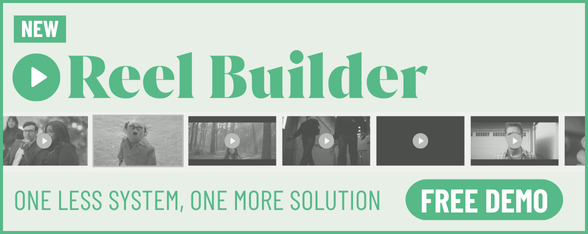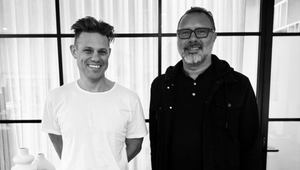
How Amplify is Experimenting With Innovation Practice FUTURES

Amplify has introduced FUTURES, a dedicated innovation practice designed to assist brands to navigate and use emerging technologies for creative storytelling and immersive experiences.
This initiative is part of Amplify’s mission to help brands build engaging worlds and memorable narratives, and will be led by innovation creative director Ed Hallam and head of special projects Izzy Kertland.
Ed and Tim Baggott, Amplify's executive creative director, spoke to LBB to unpack their vision for FUTURES.
They delve into how FUTURES empowers brands to explore creative technology through rapid experimentation, offering a distinct approach from traditional agency models.
LBB> Can you explain the core objectives of FUTURES and how it differentiates from Amplify’s traditional offering?
Ed> FUTURES is a dedicated innovation practice focused on helping brands embrace and navigate creative technology, entertainment, and IP. The core component of FUTURES is a self-initiated experiment series – a program designed to build and test new ideas at speed, creating prototypes to drive the future of experience and campaign storytelling.
Tim> What sets FUTURES apart from Amplify’s traditional offering is that the experiment series enables us to explore the potential of emerging technology without needing a specific, timely brief to come along to do so. It allows us to pursue new creative horizons as soon as they appear.
LBB> How do you envision FUTURES influencing the direction of Amplify’s brand work for major clients like Nike and Google?
Ed> The beauty of incubating FUTURES over the past two years has already started to shape how we approach client work, from understanding AI’s role in creating connected experiences to diving into academic research that uncovers new opportunities for brands to innovate.
This is just the beginning. We’re journeying with clients like Nike and Google to build technologies. It’s not a separate craft from our day-to-day work; instead, it’s an evolution of our storytelling approach.
Tim> Innovation has always been part of Amplify’s creative DNA. Still, the launch of FUTURES has ignited renewed enthusiasm and optimism towards the power of technology to yield new experiences – this attitude permeates our work with clients throughout our global network.
LBB> What emerging technologies are you most excited about integrating into FUTURES projects?
Ed> I’m excited for the buzz around generative and synthetic media to die down, to move away from fear-inducing headlines and start to focus on AI being put into the hands of visionary storytellers, musicians, and artists to bring their worlds to life in new ways.
Tim> As a lifelong music enthusiast, I gravitate towards any technology that opens the door to new ways of creating and experiencing live or recorded music.
LBB> Could you provide examples of how FUTURES has already impacted recent campaigns or projects?
Tim> The learnings from our first AI-focused experiment, as well as experiment collaborator, AI specialist Eughan O’Keaffe, were brought into the development and execution of Samsung Chorus of Light, the immersive, interactive light installation Amplify created for this year’s VIVID Sydney. When we pitched the concept to Samsung, we had already assembled the right team and knew how to approach it.
LBB> What role does collaboration play in FUTURES, particularly with external creative technologists and other industry experts?
Ed> In the last 18 months, Amplify has collaborated with creative technologists from across a variety of disciplines - Eoghan O’Keaffe, an AI specialist; Sean Malikides, who creates electronic, mechanical and sonic artworks with his design practice Kai Labs; and Tigris Li, an artist and creative technologist whose collaborative work with FUTURES will be showcased in summer 2024.
Most importantly, FUTURES believes in the power of community, so will be inviting brands and audiences to participate in this work, making it possible to download the code and access research through a series of prototype drops.
LBB> How does the experiment series within FUTURES contribute to the development of new ideas and prototypes?
Ed> Our experiments disrupt traditional agency roles, encouraging cross-departmental collaboration. This approach allows creatives, producers, and technologists to contribute ideas, breaking away from the usual hierarchical process. The result is a wealth of innovative ideas we prioritise and rapidly prototype. These prototypes provide a clear path from concept to execution.
For example, our AI-powered music experiments have directly inspired recent client work, demonstrating how ideas born in experimentation can influence real-world projects.
Tim> With Samsung Chorus of Light, the experiment series gave us the confidence to pitch the concept in the first place. Knowing we had already explored applications of generative AI with a trusted collaborator meant we were asking for less of a leap of faith when executing the idea.
LBB> In what ways does FUTURES plan to involve brands and audiences in its innovation processes?
Ed> Each experiment in FUTURES is unique, and we’re excited to invite brands into the process. Whether participating in our creative sprints or co-developing briefs inspired by the experiments, brands can immerse themselves in the innovation.
LBB> Can you share insights into the creative and technical challenges of combining technology with brand storytelling?
Tim> It’s vital to remember that the technology is not the idea. It is the vehicle for the concept or story. As an agency committed to positively contributing to and supporting culture, we’re most excited about harnessing the power of new technology to create new culturally-connected experiences that audiences will seek out.
Ed> One of the biggest challenges is ensuring that technology enhances the experience without overshadowing the story. While it’s tempting to let the tech take centre stage, the real focus should always be on the audience’s emotional engagement. Whether using AI or robotics, what matters most is how it deepens the connection with the audience rather than the mechanics behind it. Technology should be felt, not just seen.
LBB> What future trends or shifts do you anticipate in the creative technology landscape, and how are FUTURES preparing for them?
Tim> The exponential speed at which new technology develops makes making specific predictions challenging. Still, technology will continue to evolve at pace, integrating both obviously and subtly into our daily lives and online and offline spaces.
This is precisely why the FUTURES experiment series exists. The experiments enable us to react quickly and get hands-on experience with emerging technology as it develops. The sooner we understand it, the better equipped we are to make informed decisions on if and how it could be meaningfully applied to our work with our clients.
Ed> At the same time, there’s a return to low-fi tech — USB drops and file transfers are making a comeback in culture, and people are craving dumb phones, which presents exciting opportunities for reimagining how brands interact with their audiences. We’re preparing by balancing cutting-edge innovation with a sensitivity to cultural shifts.
LBB> How do you measure the success of a FUTURES project, and what criteria do you use to evaluate its impact on brand experience and storytelling?
Ed> We apply traditional success metrics for client projects — engagement, reach, and brand impact. However, for our experiments, success can be less statistic-driven. It’s about testing hypotheses: Does the experience spark the imagination? Does it inspire our studio to think differently? We don’t settle for a single outcome; we iterate, building on each experiment to continuously push the possible limits.












